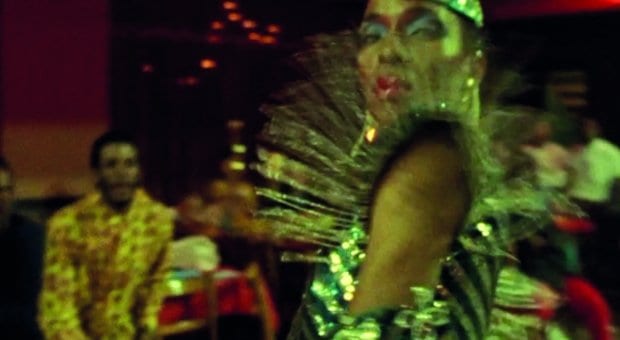How did Madonna, Jean Paul Gaultier, RuPaul’s Drag Race denizens and contemporary hip-hop artists like Mykki Blanco first get turned on to the art of voguing? Through street-smart, larger-than-life Harlem drag ball fixtures such as Willi Ninja and Venus Xtravaganza, profiled in Jennie Livingston’s landmark 1991 documentary, Paris Is Burning.
A compelling exploration of the thriving late 1980s NYC ball culture and its disenfranchised African American and Latino participants, Paris Is Burning remains one of the most commercially successful documentaries ever released. On Mon, Dec 9, Montreal’s Concordia University will host a special screening of the film to celebrate the launch of the latest addition to Queer Film Classics, a seven-year book series (launched in 2009, it will see three titles published each year until 2015) from Canada’s Arsenal Pulp Press that will eventually cover 21 influential films about and by queer people.
Author Lucas Hilderbrand’s book offers a revealing, thoughtful and personal response to Paris that will appeal both to devout “House of Ninja” fans as well as newbies to this elaborate ball scene, wherein competitors were asked to strut down catwalks and flawlessly performed in a given category, ranging from “Town and Country” to “Executive Realness (Wall Street).” These balls often gave contestants a creative outlet to transcend the compound discrimination they endured daily.
Hilderbrand, an associate professor at the University of California, Irvine, recalls how much of a crossover hit the film was at the time. “Because of its massive success, it reached a wider audience, particularly young queers, who wouldn’t have been able to find it otherwise,” he says. “It found audiences that weren’t just going to film festivals or art-house theatres. Michael Moore had made one documentary at that point, but there really wasn’t that broader culture of crossover documentary.”
In fact, Hilderbrand’s book addresses the fact that most people often lump together the film and the ball community as one and the same. His monograph celebrates the film’s unique approach to storytelling. “The film is less interested in where these people come from and more in the humanity of the figures that we see onscreen and the very interesting ways in which they’re navigating their social marginality with a lot of ingenuity.”
Those who took a liking to the vibrant film and its shrewd survey of racial, class, gender and sexual inequalities will undoubtedly recall the film’s very vocal detractors at the time of its release (the most high profile was feminist author and social activist bell hooks), who railed against what they regarded as an exploitative documentary that pandered to white film-going elites.
Concordia professor Matthew Hays, co-editor of Queer Film Classics (and also an Xtra contributor), remembers seeing the film with a packed house in Montreal around that time. “It was this incredibly powerful moment, because so many of us were thrilled that so many issues were being addressed at once — gender, sexual orientation, race, class and the idea of the privileged gaze. I think hooks raised some extremely important issues, in terms of how audiences were receiving the film and whether or not that could really be considered progress. These are all issues that continue to resonate today.”
Hilderbrand believes there’s been a shift in people’s take on the film, with most of the more recent writing reappraising Paris and finding value in it. One of the early films in the New Queer Cinema pantheon, its lasting cultural resonance confirms it was doing more than merely chronicling a subculture at its peak. “It’s cited on RuPaul’s Drag Race or in Icona Pop music videos, people keep returning to it, and it keeps recirculating in pop culture in a way that even something as big as My Own Private Idaho [editor’s note: a blockbuster by New Queer Cinema standards, also released in 1991] doesn’t seem to have,” Hilderbrand says. “Part of it is about this idea that people are questioning their identities by way of the film and also finding it to be deeply inspirational.”
Paris Is Burning: live performance, film screening and book launch of the Queer Film Classics monograph with author Lucas Hilderbrand in attendance
Mon, Dec 9; book signing begins at 6:30pm
JA de Sève Cinema, 1400 de Maisonneuve W, Concordia University
Join the Facebook event page

 Why you can trust Xtra
Why you can trust Xtra


